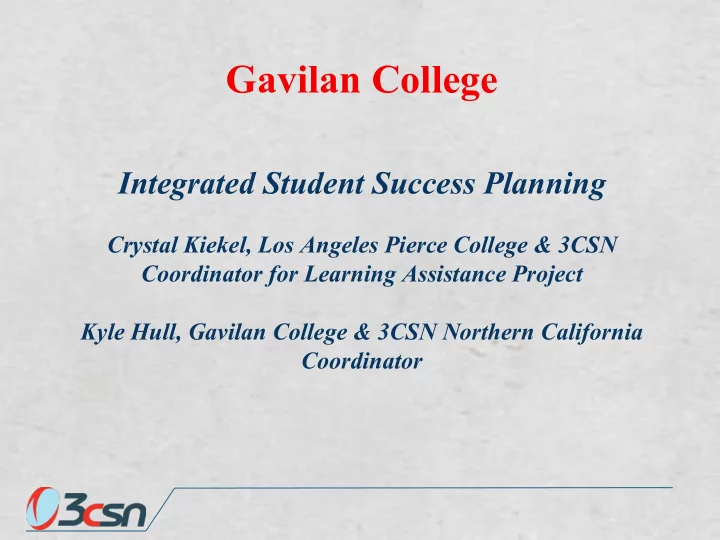

Gavilan College Integrated Student Success Planning Crystal Kiekel, Los Angeles Pierce College & 3CSN Coordinator for Learning Assistance Project Kyle Hull, Gavilan College & 3CSN Northern California Coordinator
Outcomes for the Day Identify campus-wide student success “convergent goals” 1. based on the existing campus initiatives. Explore how “equity” frames student success. 2. Draft a “theory of change” outlining the campus’ vision for 3. student success. Create a plan for an ongoing conversation. 4.
Norms •Group Share: Think about a time in your experience when you felt most effective and engaged. What made this experience so powerful? •Ground rules •Additions? Revisions?
Think, Pair, Share •Find someone in the room you don’t know… •Reflection: Think about your first week of college. What were some of your expectations, fears, highlights, and low points? What do you remember most? Who were the people and what were the events that helped (or didn't help) you get through the week?
Integration Defined •Planning across a complex, multi- component organization •Coordinated & intentionally interdependent within the organization •Focused on the goal of student success; all plans continuously strive to meet this goal
Good Integrated Planning v Students see one system v Creates ownership/avoids silos v Avoids “initiative fatigue” v Avoids “mission drift” v Provides more flexibility with funding v Now a requirement in many statewide plans
Good Integrated Planning • Iterative!! • Inclusive • Practitioner focused • Based on core principles/goals • Summarizes / Identifies common elements • Broadly communicated
This image cannot currently be displayed. This image cannot currently be displayed.
What is Appreciative Inquiry (AI)? • Appreciative Inquiry is the study and exploration of what gives life to human systems when they function at their best. • This approach to personal change and organization change is based on the assumption that questions and dialogue about strengths, successes, values, hopes, and dreams are themselves transformational. (from The Power of Appreciative Inquiry by Diana Whitney and Amanda Trosten-Bloom )
A Positive View of Organizations “Organizations are, first and foremost, centers of human relatedness and relationships come alive where there is an appreciative eye, when people see the best in one another and the whole, when they share their dreams and ultimate concerns in affirming ways, and when they are connected in full voice to create not just new worlds, but better worlds. By making it possible for every voice to be heard, a life giving process is enacted.” (from The Appreciative Organization by Harlene Anderson, David Cooperrider, et. al. )
Appreciative Inquiry - Simply Put… If we continue to search for problems, we will continue to find problems If we look for what is best and learn from it, we can magnify and multiply our success
Framework for Appreciative Inquiry
Break
Example of IP Based on Convergent Student Success Goals 15
Report Out, Reflections, and Scale Poster Instructions • Take a blank poster. • On the top of the poster, list your college’s two convergent goals that you identified. • At the bottom, list the activities that you identified that serve the most students . Then, list the professional learning that is needed to support these activities.
Read Together
LUNCH!
Equity Crosswalk •Get into groups by initiative (BSI, SSSP, etc.) and choose post-it color. •Think about the major activities in your initiative. How might they map to one of the five Student Equity Metrics? •List the major activities, and place them on the appropriate poster.
3CSN’s ToC Narrative If we provide training on networking and we use action research methodologies, community college professionals will transform their environments and identities to create communities of practice that will produce powerful learning and working across campuses. This will lead to greater student success.
Theory of Change Medium Long Term Short Term Term Activities Impact Outcomes Outcomes Outcomes Leveraging Mechanisms
3CSN’s ToC Narrative If we provide training on networking and we use action research methodologies, community college professionals will transform their environments and identities to create communities of practice that will produce powerful learning and working across campuses. This will lead to greater student success.
If we provide learning opportunities in Habits of ç Mind for faculty, staff, and peer educators, then this will strengthen the campus wide support for ç first year students and lead to increased student ç success, ultimately providing a pathway for ç ç transformative learning among all West Hills ç college Coalinga students faculty, staff, and peer educators.
ToC Narrative – Mad Libs Style If we provide _____and we use _____, then _______ (professionals, students, etc) will _______. This will lead to _______, which will lead to greater student success.”
Recommend
More recommend